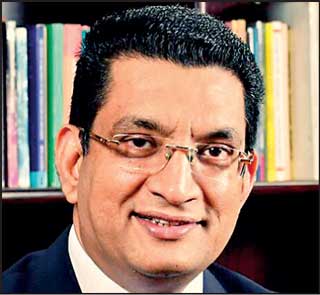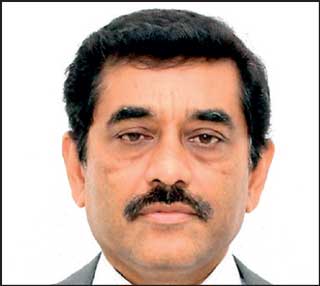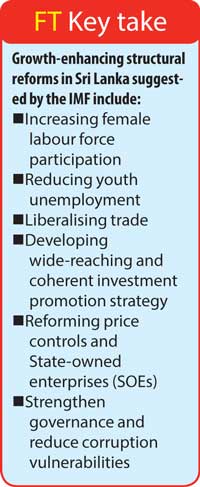Sunday Feb 15, 2026
Sunday Feb 15, 2026
Monday, 2 May 2022 00:00 - - {{hitsCtrl.values.hits}}
The chorus is getting louder for critical reforms, and the latest rally and strong articulation comes from none other than the Finance Ministry and the Central Bank given the country’s precarious economic situation.
 |
| Finance Minister Ali Sabry |
 |
| Finance Secretary Mahinda Siriwardena |
 |
| CBSL Governor Dr. Nandalal Weerasinghe |
For years, the private sector as well as international donor agencies have called for structural reforms but successive governments have shied away, soft-peddled or even postponed this dire need due to cheap political benefits.
Last week, the Finance Ministry and the Central Bank further drummed up the need for urgently kick off reforms.
“We must use the crisis as an opportunity to undertake difficult reforms,” CBSL Governor Dr. Nandalal Weerasinghe told journalists on Friday.
Separately the CBSL in its 2021 Annual Report, also stressed the need to start bold structural reforms to revitalise medium to long term macroeconomic stability, which remains a necessary condition for long-term inclusive growth.
“In this regard, the implementation of several structural reforms is vital at this juncture by the Government to complement the Central Bank’s remedial policies. Implementing strong fiscal adjustments, which have been long delayed and often reversed in the past, will lead to a visible turnaround in the current complex economic turmoil,” the CBSL said.
“Sri Lanka should urgently undertake difficult, but much-needed and far-reaching reforms to address the accumulated and persistent issues,” said the Finance Ministry under the leadership of Minister Ali Sabry and Secretary Mahinda Siriwardena in its first information series note titled ‘Fiscal sector: Present situation and way forward’.
“The time has come to put the ‘house in order’ and revamp the Government’s fiscal operations to strengthen macroeconomic stability and facilitate economic growth in the medium to long term,” it said.
The Finance Ministry said the Government’s decision to seek the assistance of the International Monetary Fund (IMF) will be a starting point and a catalyst to implement these critical reforms with the support of the citizens and other stakeholders.
“Failure to implement required policy reforms at this critical juncture will be very costly. However, it will lay a strong foundation to create a modern and robust economy for the future generations to come,” it added.
The Finance Ministry also emphasised that the support of the private sector, the public and international agencies is crucial in implementing fiscal reforms, with a strong social protection network to support the poor and vulnerable.
“Clear communication with the public, business and investor communities will be important to ensure a sustained reform process,” it said.
It is also important to foster the understanding that Government expenditure on public services and welfare comes at the expense of higher levels of taxation or continued borrowings.
“Sri Lanka can no longer afford to run high budget deficits, and whilst there is a requirement for greater investment in sectors such as education, healthcare, public transport, and service delivery, there are several aspects of Government expenditure that require rationalisation,” the Finance Ministry stressed.
“It is observed that a culture of unproductive Government subsidisation and handouts is no longer viable. Instead, a stable macroeconomic environment which empowers citizens to thrive along with the necessary social protection mechanisms, would result in a more stable and sustainable economic outcome,” Finance Ministry added.
It also warned that failure to implement required policy reforms at this critical juncture will be extremely costly. “In recent months, Sri Lanka has already experienced the adverse outcomes of failing to implement these reforms in the past.
“Hence, it is vital that Sri Lanka uses this turbulent situation as an opportunity to undertake difficult but much needed reforms to address the long-standing macroeconomic issues and lay a strong foundation to create a modern and robust economy for future generations to come,” it added.
In their report in March, the IMF Directors called for renewed efforts on growth-enhancing structural reforms in Sri Lanka.
They include increasing female labour force participation, reducing youth unemployment, liberalising trade, developing a wide-reaching and coherent investment promotion strategy, and reforming price controls and State-owned enterprises (SOEs). Efforts to strengthen governance and reduce corruption vulnerabilities should continue.
Other measures recommended included substantial revenue-based fiscal consolidation.
“Reforms should focus on strengthening VAT and income taxes, through rate increases and base broadening measures. Fiscal adjustment should be accompanied by energy pricing reforms to reduce fiscal risks from loss making public enterprises. Institution building reforms, such as revamping the fiscal rule, would help ensure the credibility of the strategy,” the IMF said.